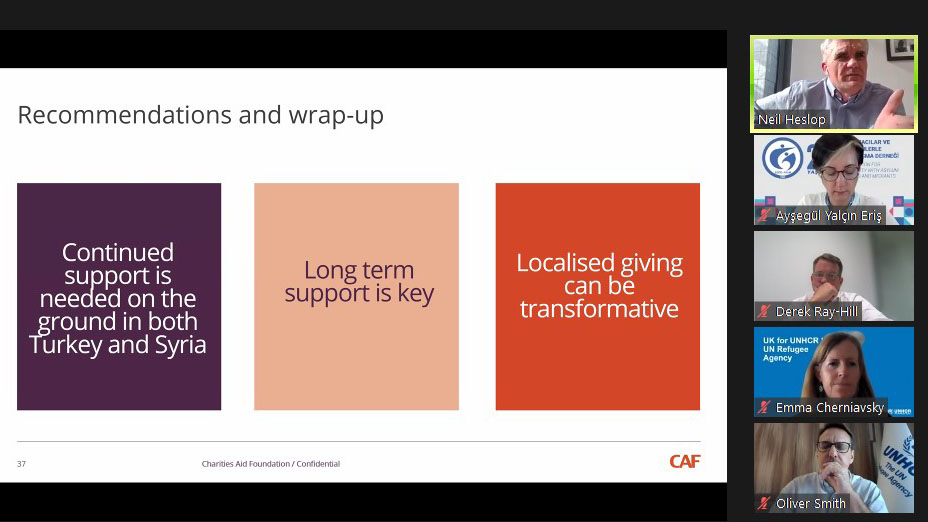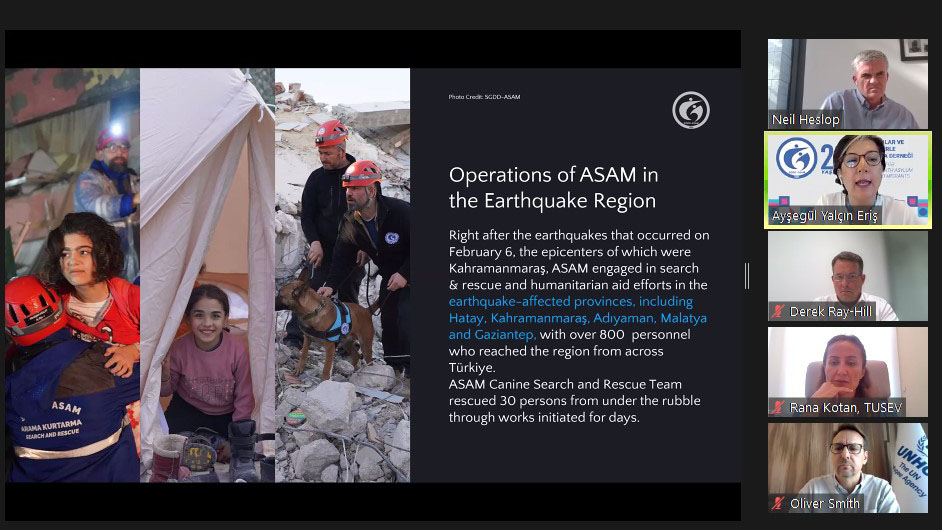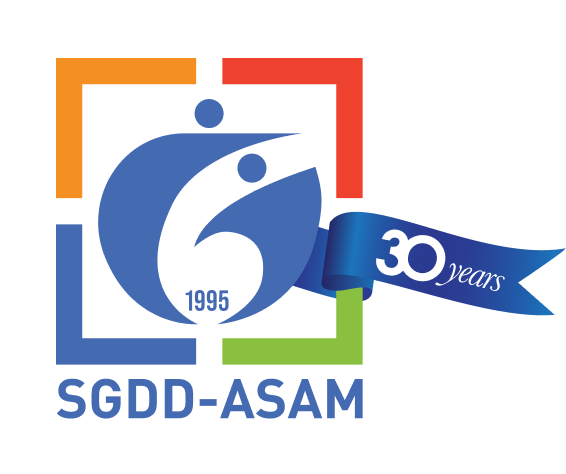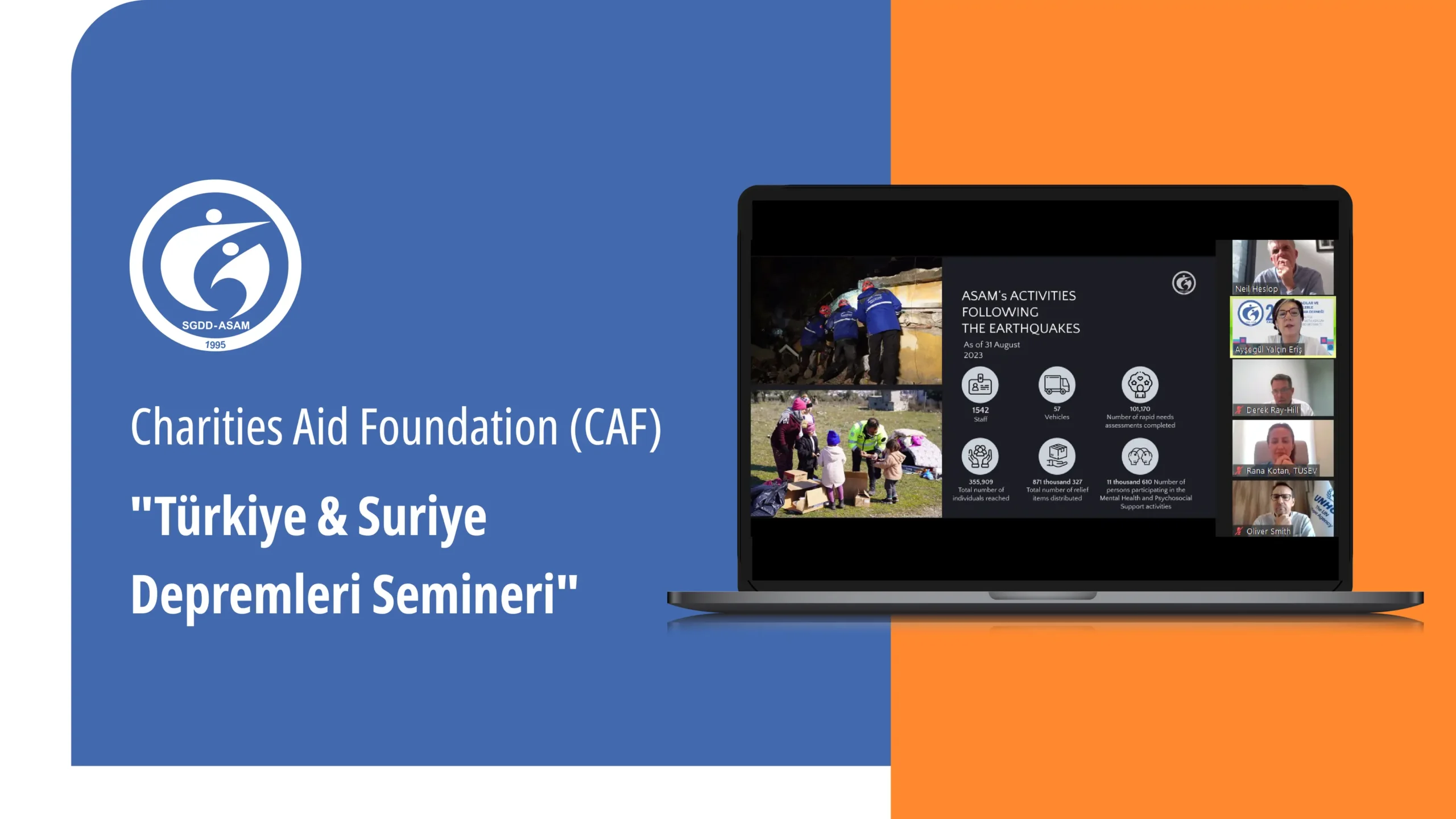During the webinar, in which CAF Chief Executive Neil Heslop, Senior Vice President of External Affairs for CAF America Jessie Krafft, Chief Executive Officer of the UK for UNHCR Emma Cherniavsky, and TUSEV (Third Sector Foundation of Türkiye) Secretary General Rana Kotan participated, the situation in the field, the works conducted for reacting to the challenges, and future goals were discussed. It was discussed during the webinar that more than six months had elapsed since the devastating earthquake, yet there were still significant humanitarian needs in the field. Participants deliberated on how the donations could be utilized to create the most effective solutions and how the support provided in addressing challenges could lead to transformative outcomes.
In the webinar held with the participation of all country representatives across the CAF network, ASAM Deputy General Coordinator Atty. Ayşegül Yalçın Eriş took part as guest speaker. Underlining the urgent and mid-term needs throughout the process covering the earthquake and its aftermath in Türkiye, Eriş explained ASAM’s earthquake-related operations in the field. Eriş said, “ASAM has established operation centers and warehouses in Hatay, Kahramanmaraş, Adıyaman, Malatya, Adana, and Gaziantep. ASAM Outreach Teams continue to reach persons in need through needs assessments and distribute humanitarian relief items to those in need in both urban and rural areas.” Indicating that protection activities for persons with specific needs and psychosocial support activities for children are being carried out in the affected region, Eriş stated that they are also organizing training sessions on the Prevention of Sexual Exploitation and Abuse (PSEA) in collaboration with the United Nations Office for the Coordination of Humanitarian Affairs (UN-OCHA) for humanitarian aid workers.
Key insights from webinar speakers

Neil Heslop, CAF Chief Executive: At CAF, we partner with donors to enable them to deliver the greatest impact. We come together with organizations to collaborate across borders to deliver assistance to those in need. Today, we want to share with you some of the work that has been going on within our network of partners to provide permanent solutions to the devastating effects of the earthquakes in Türkiye and Syria and to introduce to you our partners from different parts of the world. In thinking about how we, as a society, respond, we have to think global, but most importantly, we have to act local. In bringing together successful interventions and support, what is critical is partnership and collaboration.
Emma Cherniavsky, Chief Executive Officer of the UK for UNHCR: The earthquakes in Türkiye and Syria hit an area where there was already a large population of displaced people, and where there is a high level of humanitarian need. Many families are still displaced and remain in need of support. In the aftermath of the earthquakes, UNHCR launched a “Global Appeal”. UNHCR’s response has been focused on providing humanitarian relief. We have provided cash assistance. We have set up a Counselling Line, and we are providing protection monitoring that helps us identify families that need additional support; such as psychosocial support or legal assistance. One of the primary areas that we are working in is shelter. We are trying to transition families from living in tents to living in prefabricated housing units.
Rana Kotan, TUSEV (Third Sector Foundation of Türkiye) Secretary General: To allow for better disaster response, we published two “Monitoring Briefs”. In the aftermath of the earthquake, we brought together our members and field workers to exchange experiences. We informed the international community regarding the earthquakes. During this process, we also partnered with new organizations.
Jessie Krafft, Senior Vice President of External Affairs for CAF America: CAF America had a quick response to the earthquakes. We are still making grants to Türkiye today, which is excellent because it gives long-term support. CAF America’s basic approach to disaster is to facilitate and manage a large network of organizations globally. We maintain this network so that we are ready to respond quickly. We have information readily available to describe to donors about which organizations are locally responding, and we can support them in the selection of those organizations.
Oliver Smith, Senior Operations Coordinator for UNHCR: We sent prefabricated housing units, which were put up quickly and made to be able to provide shelter needed immediately right after the earthquake. In addition, we were able to start our protection services right away. This way, we were able to provide psychosocial support to communities suffering from trauma. We immediately shifted some of our programming to additional awareness and counseling to help people get their documentation, such as birth certificates, so that they would be able to access assistance.

Atty. Ayşegül Yalçın Eriş, ASAM Deputy General Coordinator: Almost 16 million people have been affected by the earthquake. 5 million of the people affected are children, and there are approximately 2.5 million people with disabilities. It is necessary to ensure the safety of women and children, to provide equipment to persons with disabilities, and to ensure the continued access of persons with chronic illnesses to rights and services. It is very important very important to mainstream gender-sensitive earthquake response, psychosocial support, and protection interventions. Addressing the fundamental needs, particularly housing, of approximately 3 million who have been displaced to other provinces, and ensuring their sustainability, is crucial. Providing measures and additional incentives for provinces experiencing a significant influx of migration is of paramount importance.
Yörük Kurtaran, Member of Trustees of Support Foundation for Civil Society (STDV): We mobilize local and international funding to support organizations on the ground with grants. Most of our grants go to core funding, which means around half of our budget goes to smaller organizations. What we did was we mobilized grants to more than 70 organizations. Some of them were emergency grants. But a greater amount of them were about long-term support. I think it is important to understand the context, and the context is that Türkiye is in an economic and currency crisis. Once the earthquake happened and since then, we have been trying to mobilize resources to support civil society organizations on the ground. Until February 2024, we pledged to mainstream earthquake in all our thematic fundings. We hopefully will be supporting long-term grass-root projects of these organizations. Within the context of Türkiye, civil society is viable, strong, responsive, and agile. As long as the space is provided, civil society delivers in Türkiye.

